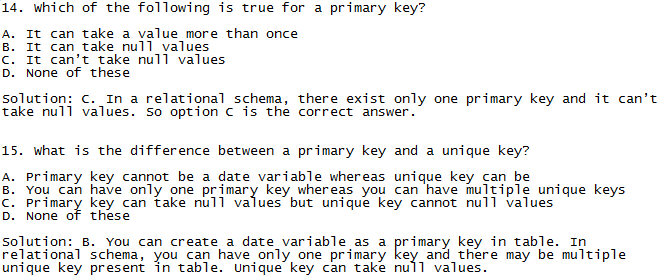This article was posted by Ankit Gupta.
Introduction:
If there is one language, every data science professional should know – it is SQL. SQL stands for Structured Query Language. It is a programming language used to access data from relational databases.
We conducted a skilltest to test our community on SQL and it gave 2017 a kicking start. A total of 1666 participants registered for the skilltest.
This test focuses on practical aspects and challenges people encounter while using Excel. In this article, we provide answers to the test questions. If you took the test, check out which areas need improvement. If you did not take the test, here is your opportunity to look at the questions and check your sill level independently.
Two sample questions from the skilltest
Overall Scores
Below are the distribution of scores, this will help you evaluate your performance:
You can assess your performance here. More than 700 people participated in the skilltest and the highest score was 41. Here are a few statistics about the distribution.
Overall distribution
Mean Score: 22.32
Median Score: 25
Mode Score: 27
This is an interesting distribution. I think we are seeing 3 different profiles of people here:
- There are ~20 people who did not score at all. They either faced some technical problem or did not like the test or did not know SQL.
- There is another population which looks to have normal distribution between scores 1 to 10. These people either started the competition late and hence could not get enough time or they are just beginners in SQL.
- Third population looks to have distribution between scores 10 and 41 and looks like a representative of people in industry. For this group, mean is 25.8 and standard deviation ~ 6.5 . So any one with a score of more than 32 is in top 16% of the population.
To see how much did you score and where do you fit, click here. For more about SQL, click here.
Top DSC Resources
- Article: What is Data Science? 24 Fundamental Articles Answering This Question
- Article: Hitchhiker’s Guide to Data Science, Machine Learning, R, Python
- Tutorial: Data Science Cheat Sheet
- Tutorial: How to Become a Data Scientist – On Your Own
- Categories: Data Science – Machine Learning – AI – IoT – Deep Learning
- Tools: Hadoop – DataViZ – Python – R – SQL – Excel
- Techniques: Clustering – Regression – SVM – Neural Nets – Ensembles – Decision Trees
- Links: Cheat Sheets – Books – Events – Webinars – Tutorials – Training – News – Jobs
- Links: Announcements – Salary Surveys – Data Sets – Certification – RSS Feeds – About Us
- Newsletter: Sign-up – Past Editions – Members-Only Section – Content Search – For Bloggers
- DSC on: Ning – Twitter – LinkedIn – Facebook – GooglePlus
Follow us on Twitter: @DataScienceCtrl | @AnalyticBridge


